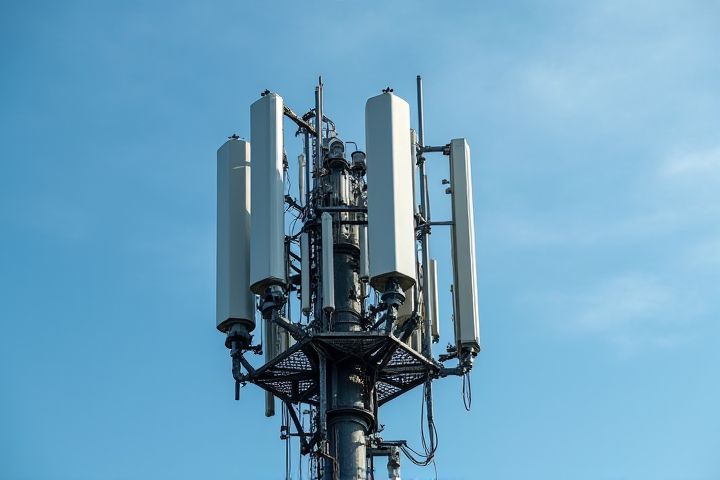
The telecom industry in Nigeria is one of the fastest-growing sectors in Africa, driven by increased mobile penetration and demand for Internet connectivity. Major players like MTN, Airtel, and Glo dominate the market, offering a broad range of communication services, from voice calls to broadband Internet. The Nigerian Communications Commission (NCC) regulates this vibrant industry, ensuring fair competition and consumer protection. With over 200 million mobile subscribers, Nigeria enjoys substantial growth potential, particularly in mobile financial services and digital innovations. Investments in infrastructure continue to enhance service delivery, making telecommunications a cornerstone of Nigeria's economic development.
Market dominance by few major operators
The Nigerian telecom industry is characterized by a significant market concentration, primarily dominated by a few key operators such as MTN, Airtel, and Glo. These companies account for a substantial share of the subscriber base, driving competition and influencing pricing strategies across the sector. Market dominance has led to rapid advancements in mobile technology, increased internet penetration, and enhanced service delivery, benefiting consumers. However, this oligopolistic structure also poses challenges for new entrants aiming to compete in a landscape shaped by established giants.
Rapid growth in mobile penetration
The Nigerian telecom industry has experienced remarkable growth, with mobile penetration soaring to over 90%, making it one of the highest rates in Africa. Major players like MTN, Airtel, and Glo are competing aggressively to expand their market share, offering innovative services including mobile banking and data packages. The government's policies and investments in infrastructure have significantly contributed to this growth, facilitating enhanced network coverage in rural and urban areas alike. Your engagement with this dynamic market can reveal numerous opportunities, particularly in areas like digital content and e-commerce, driven by the increasing use of smartphones.
Expansion of broadband services
The telecom industry in Nigeria is experiencing rapid expansion, particularly in broadband services aimed at increasing internet accessibility across urban and rural areas. Major telecommunications companies, such as MTN and Airtel, are investing significantly in infrastructure to enhance network coverage and improve service quality. The Nigerian government is supporting this growth through initiatives like the National Broadband Plan, which aims to achieve 70% broadband penetration by 2025. This expansion not only boosts economic development but also enhances access to digital education, e-commerce, and telemedicine for millions of Nigerians.
High data consumption trends
The telecom industry in Nigeria is experiencing a significant shift towards high data consumption trends as users increasingly rely on mobile internet for communication and entertainment. With over 200 million mobile subscribers, the demand for data-intensive services such as streaming, social media, and online gaming is skyrocketing. Major telecom operators are investing in expanding their infrastructure and optimizing network capacity to meet this growing demand, ensuring faster internet speeds and improved connectivity. You can benefit from these advancements, as Nigeria's telecom sector continues to evolve, providing enhanced communication solutions tailored to consumer needs.
Challenges with network infrastructure
The telecom industry in Nigeria faces significant challenges related to network infrastructure, which hampers connectivity and limits service quality. Poor road networks and inadequate power supply impede the installation and maintenance of essential telecommunications equipment, resulting in frequent service interruptions. Furthermore, regulatory hurdles and insufficient investment in rural areas exacerbate disparities in coverage, leaving many regions underserved. To enhance network reliability, strategic partnerships and innovative technologies are essential to address these infrastructural deficiencies and support Nigeria's expanding digital economy.
Regulatory reforms and policies
The telecom industry in Nigeria is significantly influenced by regulatory reforms and policies aimed at improving market competition and consumer protection. The Nigerian Communications Commission (NCC) plays a crucial role in overseeing these regulations, which include measures to promote fair pricing, enhance service quality, and ensure universal access to telecommunications services. By fostering an environment conducive to investment, these regulations attract both local and international players, which ultimately boosts innovation and infrastructure development. Understanding these regulatory frameworks can help you navigate the complexities of the telecom landscape in Nigeria effectively.
Adoption of digital and fintech services
The Nigerian telecom industry is rapidly evolving, with a significant shift towards the adoption of digital and fintech services. Major telecom operators are expanding their service offerings to include mobile banking, digital wallets, and innovative payment solutions to meet the growing demand for financial inclusion. Enhanced network infrastructure and increased internet penetration are driving user engagement in these emerging sectors. As a result, you can expect diverse opportunities for seamless transactions and a more interconnected financial ecosystem across Nigeria.
Increasing investments and innovation
The telecom industry in Nigeria has seen significant growth, driven by increased investments from both local and international stakeholders. Major players are innovating through the introduction of advanced technologies, such as 5G networks and mobile payment solutions, enhancing connectivity for millions of users. Regulatory frameworks have also evolved, encouraging competition and facilitating market entry for startups focused on telecom solutions. As a result, Nigeria is positioned as a burgeoning hub for digital transformation in Africa, attracting further investment opportunities and fostering entrepreneurship.
Competition with OTT services
The Nigerian telecom industry is witnessing intense competition with Over-The-Top (OTT) services like WhatsApp, Skype, and Netflix, which disrupt traditional communication and media consumption models. Mobile network operators are adapting by enhancing their data packages and improving network infrastructure to retain customers and meet growing demands. This competitive landscape has led to innovations in value-added services, enabling telecom companies to bundle offers that include data, voice, and entertainment. As a consumer, you benefit from diverse options and competitive pricing, driving improvements in service quality across the sector.
Rural telecommunication development initiatives
The Nigerian telecom industry prioritizes rural telecommunication development initiatives to bridge the digital divide and enhance connectivity for underserved communities. Key players implement innovative solutions such as mobile network expansion, satellite communication, and infrastructure partnerships, aiming to improve access to voice and data services. Efforts include government-backed incentives and private sector investments to ensure sustainable growth in rural areas. This commitment not only drives economic development but also empowers local populations through improved access to information and communication technologies.
